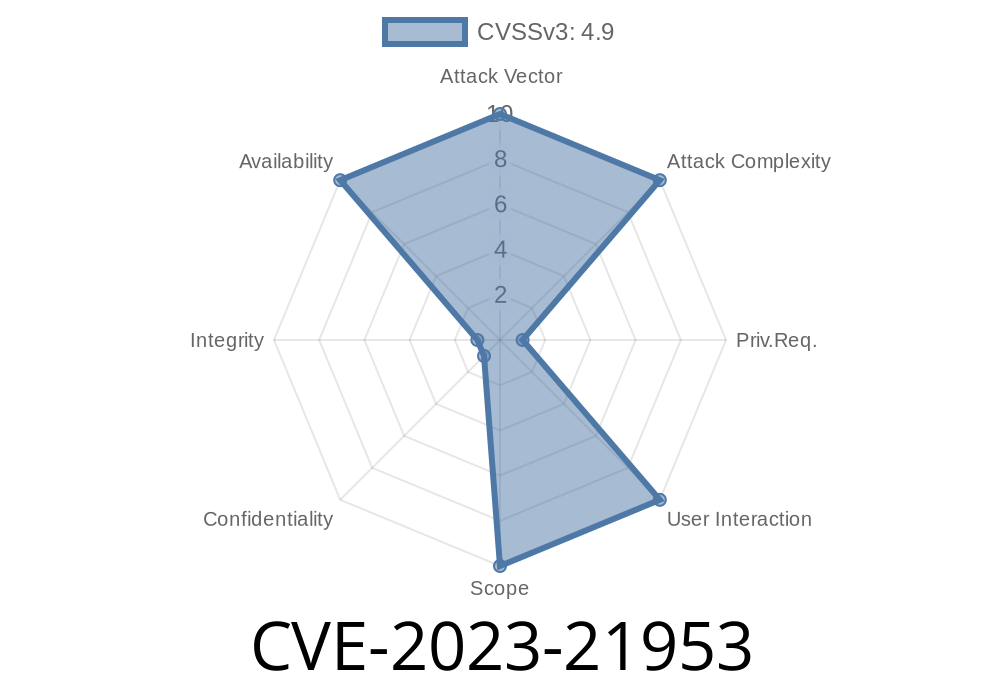CVE-2023-21953 refers to a recently discovered vulnerability in Oracle’s MySQL database, specifically in the Partition component of the MySQL Server product. This vulnerability affects all supported versions up to and including 8..32. Oracle assigned it a CVSS 3.1 Base Score of 4.9, indicating a moderate threat, with the primary risk being loss of server availability due to a complete denial of service (DoS).
Unlike most vulnerabilities, CVE-2023-21953 requires an attacker to have high privileged access, typically authenticated with elevated rights. Exploitation is possible over the network using various protocols, but user interaction isn't necessary.
How Does This Vulnerability Work?
At its core, CVE-2023-21953 is a bug in how the MySQL Partition engine handles certain queries and operations. If an attacker with sufficient privileges crafts and sends specifically malformed SQL statements related to partitions, MySQL may mishandle the input, leading to server crashes or hangs.
Since the attack method does not require user interaction and can be initiated over the network, it presents a risk where attackers could repeatedly crash the server, effectively taking it offline every time MySQL is started and the malicious statement is run.
Exploit Details & Demonstration
While Oracle has not released step-by-step proof-of-concept exploits publicly, the general pattern exploited involves partitioned tables and certain administrative DDL operations. The publications and third-party discoveries show that attackers often leverage DDL changes (like ALTER TABLE) or manipulations involving malformed partition definitions.
Here’s a simplified code snippet to illustrate a possible vector, inspired by known partition-based bugs:
-- WARNING: May crash vulnerable MySQL servers! Do NOT use outside of test environments!
-- Step 1: Create a table with partitions
CREATE TABLE crashme (
id INT,
data VARCHAR(100)
)
PARTITION BY RANGE (id) (
PARTITION p VALUES LESS THAN (10),
PARTITION p1 VALUES LESS THAN (20)
);
-- Step 2: Prepare a malformed ALTER or DROP PARTITION statement
ALTER TABLE crashme DROP PARTITION p1; -- Drop an active partition
-- Step 3: Try inserting data or using DDL/DML on the remaining partition
INSERT INTO crashme VALUES (5, 'test'); -- This might cause a crash under certain buggy conditions
*Note: Effective exploits may require more advanced crafting, depending on underlying bug specifics. Do not test on production databases!*
How Bad Is It?
This bug doesn't let attackers steal or change your data—they can just crash your database server. For some organizations, availability is critical, so a recurring crash is a big deal.
- Who’s at risk? Only MySQL servers running version 8..32 or below, where untrusted users have high privileges.
- Attackers need: A valid, high-privilege MySQL account (like DBA). Guest or application users aren’t sufficient.
- What's the impact? Complete denial of service. MySQL has to be restarted, and outage duration depends on detection and response.
---
1. Update MySQL
Apply the latest MySQL 8. patch from Oracle:
👉 Oracle MySQL Downloads
2. Review Privilege Grants
Minimize the number of users with ALTER or DROP privileges on partitioned tables. Remove unnecessary elevated grants.
3. Monitor for Unusual DDL
Use MySQL’s audit logs or performance schema to track suspicious/abnormal DDL related to partitioned tables.
4. Restrict Untrusted Network Access
Do not expose MySQL server on the public Internet or unauthenticated networks, especially for accounts with high privileges.
References
- Oracle Critical Patch Update Advisory - January 2023
- CVE Record at NIST NVD
- MySQL Release Notes 8..33
- Partition Handling in MySQL
Conclusion
CVE-2023-21953 might seem like "just" a crash bug, but if your business depends on MySQL availability, it’s urgent to patch and audit privileges now. Denial of service can be devastating, and this bug is simple to exploit for anyone with high-level access.
Stay informed about Oracle’s security advisories.
*Always keep your database software up to date, and remember: security is not just about keeping intruders out—but also about keeping your systems alive and serving your business.*
*For further technical deep-dives and updates, follow Oracle's official security blog, or visit the MySQL Security Documentation.*
Timeline
Published on: 04/18/2023 20:15:00 UTC
Last modified on: 04/27/2023 15:15:00 UTC
